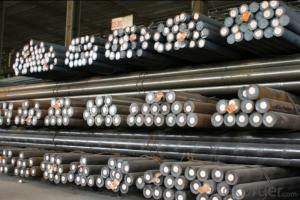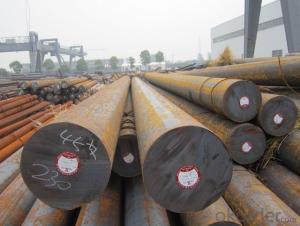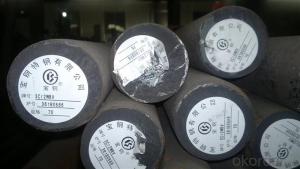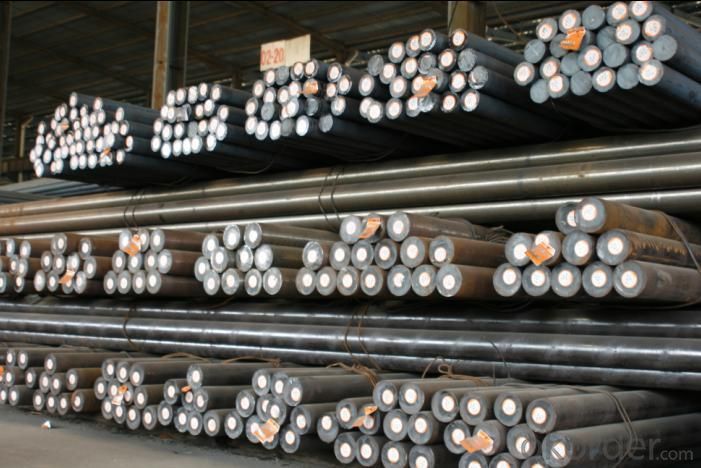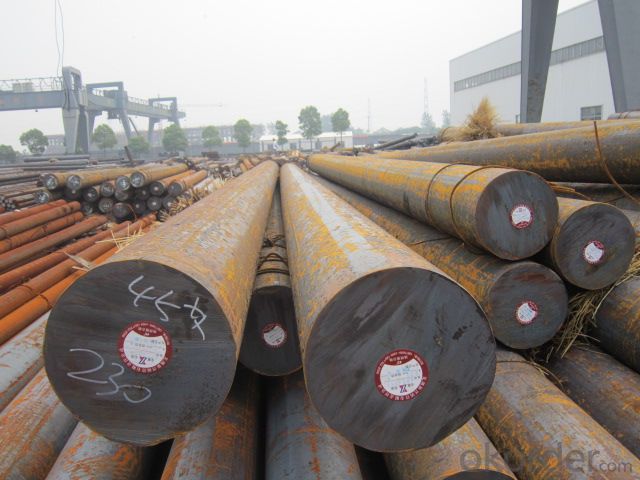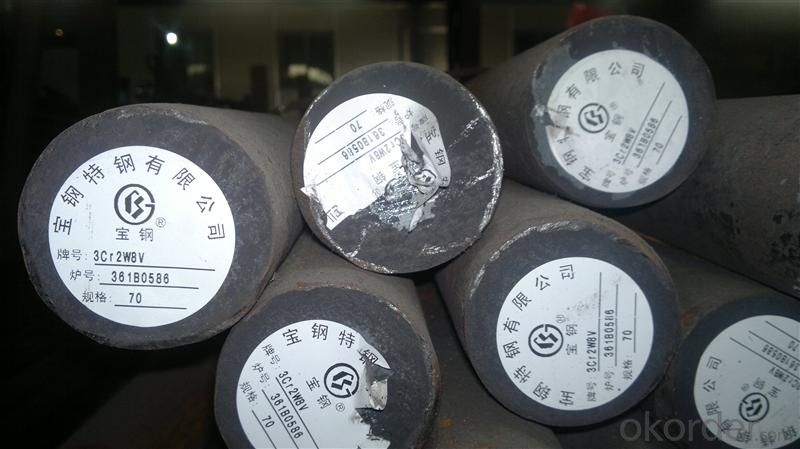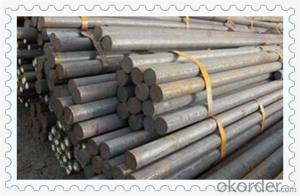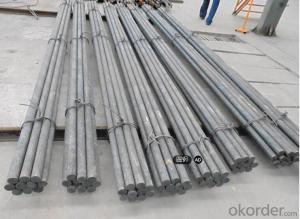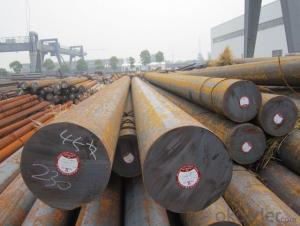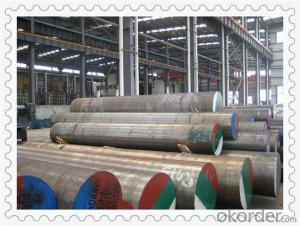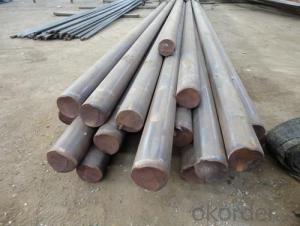AISI 1045 Round bar Special Steel Carbon Steel
- Loading Port:
- China main port
- Payment Terms:
- TT OR LC
- Min Order Qty:
- 25 m.t.
- Supply Capability:
- 10000 m.t./month
OKorder Service Pledge
OKorder Financial Service
You Might Also Like
Specification
Chemical Composition(GB)%
| standard | C | Si | Mn | P | S | Ni | Cr | Cu |
| 45 | 0.42-0.50 | 0.17-0.37 | 0.50-0.80 | ≤0.035 | ≤0.035 | ≤0.30 | ≤0.15 | ≤0.25 |
| S45C | 0.42-0.48 | 0.15-0.35 | 0.60-0.90 | ≤0.030 | ≤0.035 | ≤0.20 | ≤0.20 | ≤0.230 |
Heat Treatment
| Item | Temperature ℃ | Hardness |
| normalizing | 850-870 | 170-217HBS |
Characterstics
| 1.Commonly used in carbon quenched and tempered steels |
| 2.Higher strength and better cutting processability |
Applications
| 1.Suitable for cold stamping die wedge, screw, plate, etc |
| 2.Other parts of cold work mould |
| 3.Used for hot forging, die casting, hot stamping and hot mould parts |
Product show

Workshop show

FAQ:
1, Your advantages?
professional products inquiry, products knowledge train (for agents), smooth goods delivery, excellent customer solution proposale
2, Test & Certificate?
SGS test is available, customer inspection before shipping is welcome, third party inspection is no problem
3, Payment Terms?
30% TT as deposit and 70% before delivery.
Irrevocable L/C at sight.
4, Trading Terms?
EXW, FOB, CIF, FFR, CNF
5, After-sale Service?
We provides the services and support you need for every step of our cooperation. We're the business partner you can trust.
For any problem, please kindly contact us at any your convenient time.
We'll reply you in our first priority within 24 hours.
- Q: How does special steel perform in cryogenic ductility?
- Special steel exhibits excellent performance in terms of cryogenic ductility. Cryogenic ductility refers to a material's ability to retain its strength and flexibility even at extremely low temperatures. Special steels are engineered specifically to endure harsh conditions, including cryogenic temperatures, making them suitable for applications such as LNG storage tanks, aerospace components, and superconductors. The composition of special steel is one of the key reasons for its exceptional cryogenic ductility. Generally, special steels are alloyed with elements like nickel, chromium, and molybdenum, which enhance their mechanical properties and resistance to low temperatures. These alloying elements provide the steel with increased strength, toughness, and resistance to brittle fracture, even in extremely cold environments. Moreover, special steels go through rigorous testing and quality control measures to ensure their performance in cryogenic conditions. This involves testing for parameters such as impact toughness, fracture toughness, and notch toughness, which are critical in assessing a material's ability to withstand brittle failure at low temperatures. Additionally, the manufacturing processes employed for special steel contribute to its excellent cryogenic ductility. Methods like vacuum induction melting and controlled cooling are often utilized to produce special steels. These techniques aid in eliminating impurities and improving the material's microstructure. This refined microstructure enhances the steel's ductility, enabling it to retain its mechanical properties even in cryogenic temperatures. In conclusion, special steel exhibits exceptional performance in terms of cryogenic ductility due to its meticulously designed composition, stringent testing, and advanced manufacturing processes. These factors make it a dependable and preferred choice for various industries that require materials capable of withstanding extreme cold conditions while maintaining strength and flexibility.
- Q: How is special steel tested for quality?
- Special steel is tested for quality through various methods such as chemical analysis, mechanical testing, and non-destructive testing. Chemical analysis involves examining the composition of the steel to ensure it meets the specified standards and requirements. Mechanical testing involves evaluating the steel's strength, hardness, and other mechanical properties. Non-destructive testing methods like ultrasonic testing or magnetic particle inspection are used to detect any internal defects or flaws in the steel without causing any damage. These rigorous testing procedures ensure that special steel meets the desired quality standards before it is used in various applications.
- Q: How does special steel contribute to the marine aftermarket industry?
- Special steel plays a crucial role in the marine aftermarket industry by offering a wide range of benefits and applications. Firstly, special steel is known for its exceptional strength and durability, making it an ideal material for manufacturing marine components and parts. These components include propeller shafts, rudders, marine engine parts, and various structural elements. The marine environment is harsh and corrosive, with constant exposure to saltwater, waves, and extreme weather conditions. Special steel, such as stainless steel or corrosion-resistant alloys, is specifically designed to withstand these corrosive elements. It provides excellent resistance to rust, pitting, and other forms of corrosion, ensuring the longevity and reliability of marine equipment. Furthermore, special steel is often used in high-performance marine engines and turbines due to its excellent heat resistance and mechanical properties. It can withstand high temperatures and pressures, making it suitable for marine propulsion systems that require superior performance and efficiency. Additionally, special steel is employed in the construction of marine vessels, including ships, offshore platforms, and submarines. Its high strength-to-weight ratio allows for the construction of lightweight yet sturdy structures, leading to improved fuel efficiency and overall performance. Moreover, special steel's ability to withstand impact and fatigue loading makes it an essential material for ensuring the safety and structural integrity of marine vessels. Moreover, special steel contributes to the marine aftermarket industry through its versatility. It can be easily fabricated and customized to meet specific design requirements, allowing for the production of unique and tailored marine components. This flexibility enables the marine aftermarket industry to provide a wide range of replacement parts and upgrades for existing vessels, enhancing their performance, efficiency, and safety. In summary, special steel is a vital component in the marine aftermarket industry. Its strength, durability, corrosion resistance, and versatility make it an essential material for manufacturing marine components, constructing vessels, and improving overall performance. With its unique properties, special steel helps ensure the safety, reliability, and efficiency of marine equipment, contributing to the growth and success of the marine aftermarket industry.
- Q: What are the applications of special steel in the defense sector?
- Special steel, also known as high-strength or high-performance steel, finds numerous applications in the defense sector due to its unique properties and capabilities. The applications of special steel in the defense sector can be classified into various categories: 1. Armor and ballistic protection: Special steel is extensively used in the manufacturing of armored vehicles, tanks, and personnel carriers. Its high strength and hardness make it an ideal material for providing protection against ballistic threats, including bullets, fragments, and explosives. Special steel plates are used to reinforce the structure and provide resistance to penetration. 2. Ammunition and weapon components: Special steel is utilized in the production of various weapon components, including barrels, bolts, and receivers. Its exceptional strength, durability, and resistance to wear and corrosion make it suitable for manufacturing firearms and ammunition. Special steel alloys can withstand high temperatures and pressure generated during firing, ensuring reliable performance and longevity of weapons. 3. Aircraft and aerospace components: Special steel is used in the construction of aircraft and aerospace components, such as landing gears, engine components, and structural parts. Its high strength-to-weight ratio allows for the production of lightweight yet robust components, enhancing the overall performance and safety of military aircraft. Special steel alloys also exhibit excellent resistance to fatigue and high-temperature environments, making them suitable for demanding aerospace applications. 4. Naval applications: Special steel plays a crucial role in the defense sector's naval applications, including the construction of warships, submarines, and naval vessels. Its corrosion resistance, high strength, and toughness make it an ideal material for shipbuilding, ensuring the longevity and structural integrity of naval platforms. Special steel is also used in propeller shafts, hulls, and other critical components that require exceptional strength and resistance to harsh marine environments. 5. Missiles and rocketry: Special steel is utilized in the construction of missiles, rockets, and their propulsion systems. Its high-temperature resistance, strength, and ability to withstand extreme forces make it suitable for manufacturing critical components, such as rocket nozzles and motor casings. Special steel alloys can withstand the intense heat and pressure generated during rocket propulsion, ensuring reliable and efficient performance. Overall, the applications of special steel in the defense sector are vast and diverse. Its unique properties and capabilities contribute significantly to the development of robust, reliable, and high-performance defense systems, ensuring the safety and security of military personnel and assets.
- Q: How does special steel contribute to reducing product recalls?
- Special steel contributes to reducing product recalls by offering enhanced strength, durability, and corrosion resistance, thereby ensuring the integrity and reliability of various products. This reduces the likelihood of manufacturing defects, material failures, and premature breakdowns, which are common causes of product recalls. By using special steel in critical components, manufacturers can enhance product performance, safety, and longevity, leading to fewer recalls and improved customer satisfaction.
- Q: How does the alloying elements affect the properties of special steel?
- The alloying elements have a significant impact on the properties of special steel. These elements, such as chromium, nickel, and molybdenum, can enhance corrosion resistance, increase strength and hardness, improve high-temperature performance, and promote the formation of specific microstructures. By carefully selecting and controlling the alloying elements, manufacturers can tailor the properties of special steel to meet specific application requirements, making it suitable for various industries such as automotive, aerospace, and construction.
- Q: How is special steel classified?
- Special steel is classified based on its chemical composition, mechanical properties, and intended applications. It can be categorized into various types such as carbon steel, alloy steel, stainless steel, tool steel, and high-speed steel. These classifications help determine the steel's suitability for specific industrial uses and ensure its quality and performance.
- Q: How does special steel contribute to the mining aftermarket industry?
- Special steel plays a crucial role in the mining aftermarket industry by offering enhanced durability, strength, and resistance to extreme conditions. This type of steel is specifically designed to withstand the demanding environments and heavy loads associated with mining operations. In the mining aftermarket industry, special steel is used to manufacture various equipment and components, such as drill bits, cutting tools, crusher parts, and wear plates. These components are subject to intense wear and tear due to the abrasive nature of the materials being mined. Special steel, with its superior hardness and toughness, ensures that these components can withstand the harsh conditions and maintain their performance over an extended period. Furthermore, special steel allows for the development of more efficient and productive mining equipment. By using high-strength steel alloys, manufacturers can design lighter equipment without compromising on strength and durability. This results in increased productivity and reduced operating costs for mining companies. Special steel also contributes to the safety of mining operations. The robustness and reliability of steel components minimize the risk of unexpected failures, which can lead to accidents and downtime. Additionally, special steel can withstand extreme temperatures, corrosion, and other environmental factors commonly encountered in mining, reducing the need for frequent replacements and repairs. In summary, special steel is essential to the mining aftermarket industry as it provides the necessary strength, durability, and resistance to extreme conditions required for mining equipment and components. It enhances productivity, reduces operating costs, and ensures the safety of mining operations, making it a critical material in the mining industry.
- Q: What are the properties of heat-resistant steel?
- Heat-resistant steel is known for its ability to withstand high temperatures without undergoing significant deformation or oxidation. It has excellent thermal stability, retaining its strength and hardness even at extreme heat levels. Additionally, heat-resistant steel exhibits low thermal expansion and good thermal conductivity, making it suitable for applications requiring thermal resistance and efficient heat transfer. It also possesses a high melting point, allowing it to maintain its structural integrity even under intense heat. These properties make heat-resistant steel ideal for applications such as furnace components, jet engine parts, and high-temperature industrial processes.
- Q: How does special steel contribute to the chemical processing aftermarket industry?
- Special steel plays a crucial role in the chemical processing aftermarket industry by offering a wide range of benefits that enhance the overall efficiency and performance of chemical processing equipment. Firstly, special steel is renowned for its exceptional strength and durability, making it ideal for applications that involve high pressure, extreme temperatures, and corrosive environments. This durability ensures that the equipment can withstand the challenging conditions and operate reliably for extended periods, reducing the frequency of maintenance and replacement. Furthermore, special steel possesses excellent resistance to corrosion, oxidation, and chemical reactions, which are common challenges in the chemical processing industry. This resistance enables the equipment to handle a wide variety of chemicals without deteriorating or contaminating the process, thus ensuring the quality and safety of the end products. Additionally, special steel can withstand the formation of scale, deposits, and other contaminants that can hinder the efficiency of the equipment, thereby reducing the need for frequent cleaning and maintenance. Moreover, special steel offers superior mechanical properties such as toughness, hardness, and impact resistance, which are essential for handling and processing heavy loads and abrasive materials. This ensures that the equipment can withstand the demanding operational conditions and maintain its performance over time, resulting in enhanced productivity and reduced downtime. Another significant contribution of special steel to the chemical processing aftermarket industry is its versatility. It can be customized and tailored to meet specific requirements, allowing for the manufacturing of complex parts and components that are essential for various chemical processes. Special steel can be fabricated into different shapes and sizes, enabling the creation of intricate designs and structures that optimize the efficiency and effectiveness of the equipment. In conclusion, special steel is a vital component in the chemical processing aftermarket industry due to its exceptional strength, durability, resistance to corrosion and chemical reactions, as well as its versatility. By providing reliable and high-performance equipment, special steel contributes significantly to the overall efficiency, safety, and productivity of chemical processing operations.
Send your message to us
AISI 1045 Round bar Special Steel Carbon Steel
- Loading Port:
- China main port
- Payment Terms:
- TT OR LC
- Min Order Qty:
- 25 m.t.
- Supply Capability:
- 10000 m.t./month
OKorder Service Pledge
OKorder Financial Service
Similar products
Hot products
Hot Searches
Related keywords
